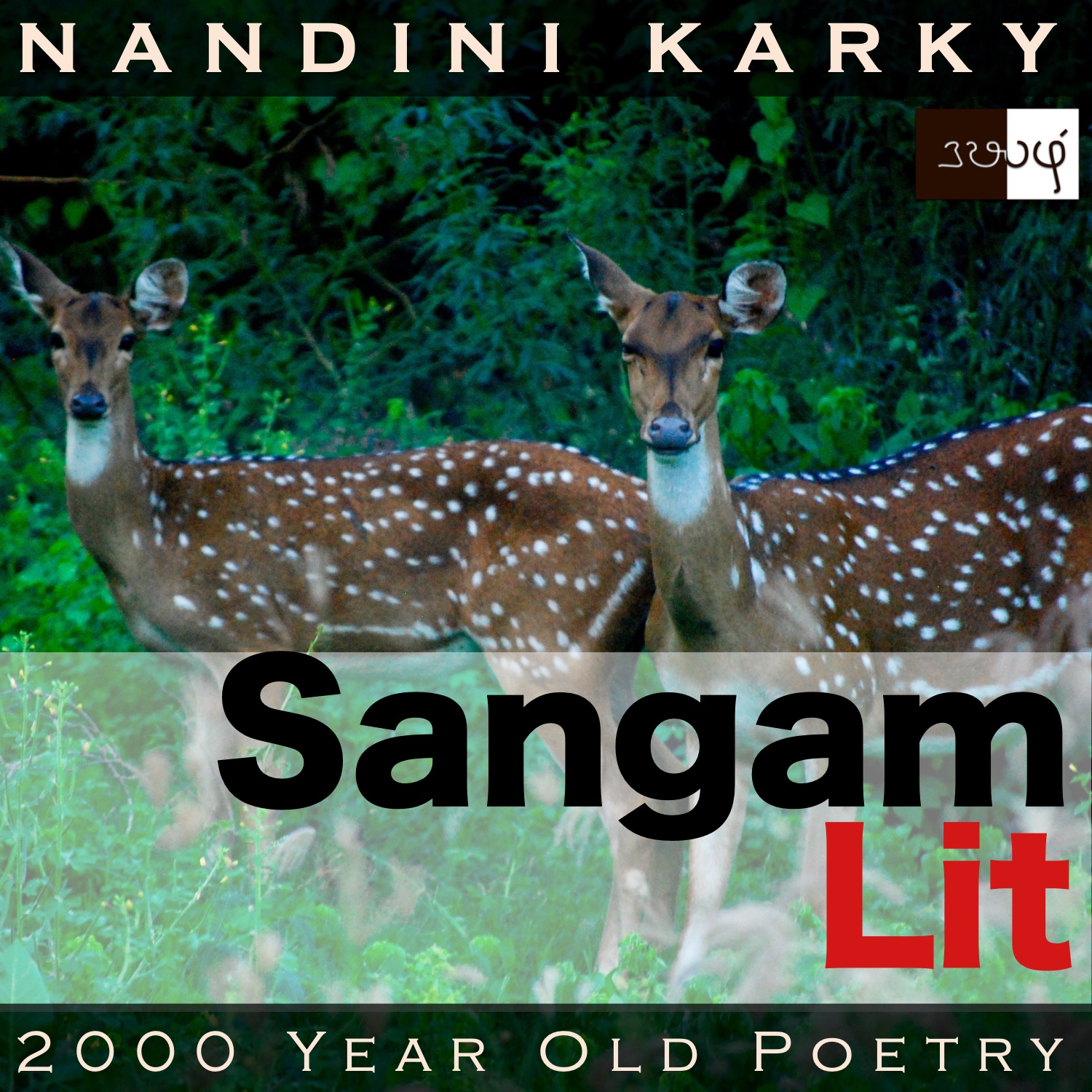Podcast: Play in new window | Download
Subscribe: Apple Podcasts | Spotify | Amazon Music | Android | iHeartRadio | TuneIn | RSS | More

In this episode, we observe how the changing season torments a lady, as depicted in Sangam Literary work, Kurunthogai 65, penned by Kovoor Kilaar. Set in the forest regions of ‘Mullai’, the verse speaks in the voice of the lady to her confidante, expressing the angst in her heart during the man’s parting away.
வன்பரல் தெள் அறல் பருகிய இரலை தன்
இன்புறு துணையொடு மறுவந்து உகள
தான் வந்தன்றே, தளிதரு தண் கார்,
வாராது உறையுநர் வரல் நசைஇ,
வருந்தி நொந்து உறைய இருந்திரோ எனவே.
On one side, there’s joy and companionship; on the other, sorrow and loneliness! The opening phrase ‘வன்பரல் தெள் அறல்’ instantly conjures before the eyes, the image of ‘clear water running over hard pebbles’, one of those visual themes that frequent meditation newsletters. Next, we get to meet ‘இரலை’ or ‘male deer’ and ‘the desirable mate’ in ‘இன்புறு துணை’. Joy seems be jumping about in the words ‘மறுவந்து உகள’ meaning ‘leaping about in delight’. In the expression ‘தளிதரு தண் கார்’, a weather report can be read for it means ‘the rainy season that brings showers’. ‘Hello’ says the male protagonist in the words ‘வாராது உறையுநர்’ meaning ‘he who stays there, without returning’. Ending with the words ‘வருந்தி நொந்து உறைய இருந்திரோ எனவே’ which means, ‘it says, are you alive with all this sadness and trouble’, the verse invokes our empathy.
A joyous deer is jumping about and someone is filled with sorrow! The context reveals that the man and lady had been leading a happy, married life when the man parted away to gather wealth. When he leaves, he promises to return before the rainy season arrives. One day, the lady turns to her confidante and says, “Making the male deer drink from the clear waters over hard pebbles and leap about in frolic with its delightful mate, the moist rainy reason has arrived. It seems to ask me whether it is to simply wish for he who stays away to return, you are living, filled with such sorrow and suffering!” With these words, the lady conveys how the promised season of the man’s return had arrived and yet, the man continues to stay away!
Can seasons speak? It seems so to the lady, who starts by noting the changes in the world around. There, near the river beds, filled with hard pebbles, crystal clear water flows. Relishing this elixir of life to its full, a male deer turns to look at its loveable mate and the joy in its heart seems to fire up its legs, for it frolics around the female deer in obvious delight. The lady zooms on to the core reason for this deer’s delight. Is it only the presence of its mate? It can’t be, for the lady specifically mentions that the male deer, frolics so only after drinking the clear waters on the hard rocks. Contrast this to a scene in the drylands of ‘Paalai’, where one finds only muddy water left behind by a ‘red dog’, as we saw in another Kurunthogai verse! Is the clear waters the male deer finds the reason for all that joy then? Delving deeper, those clear waters came to be there, courtesy of the rains that have arrived and it’s this season of showers, the lady focuses on.
Turning away from that joyful scene of the male deer’s exuberance with its mate, the lady says those rains seem to have come to her doorstep to ask whether she kept herself alive only to wish for the man to return, even as she seemed burdened by the immense sorrow of his absence. Here, the lady is performing the act of projecting her mind on the rains, which no doubt, is there to simply do its job of sustaining life. Like the lady went from the frolicking deer to the clear waters to the rains from above, I want to probe the reasons for this portrayal of women, pining for their men in their absence. Could it be that the poets of these verses themselves left their mates at home and travelled far to gain that wealth and perhaps, they sing these verses to narrate the sorrow of the beloved they have left behind. Would it then move their patrons to honour their art and send them back with the wealth they came seeking? If art imitates life, then this is one possible explanation for the theme of the pining lady that abounds these ancient verses!




Share your thoughts...